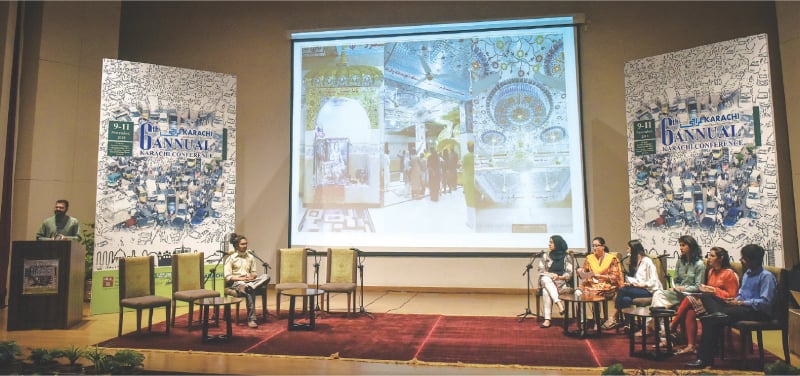
KARACHI: The three-day 6th International Karachi Conference began at the Institution of Business Administration’s (IBA) city campus on Friday afternoon.
The inaugural session titled ‘Sacred Geographies of Las Bela’ had presentations by students who studied and researched the subject.
Novaira Khan was the first speaker of the day. Her topic was the Nanak Panthi community of Bela. She said, lying west of Karachi along the Arabian Sea, Bela was a historic town that held great importance for historians and anthropologists. It had a predominant Muslim population with Buddhists and Nanak Panthi Hindu minorities. The Nanak Panthis were early followers of Guru Nanak.
Ms Khan said she came across three Nanak Panthi temples in Bela and the conversations she had with a man serving at a temple revealed that the places of worship had cultural significance as well. The Nanak Panthis spoke Sindhi and Balochi languages.
Amal Hashim was the next presenter who read a paper on the myth of the seven sisters. She said Bela tested the patience of outsiders and mentioned a cave some 20kms north of the town which had centuries-old history. Different versions of the folktale, which had commonalities in different religious cultures, existed. One such was that in order to save their honour from men, the sisters prayed to God that they be saved. Their prayers were heard, the ground split open, and they were sucked in by the ground. From then on, the place was considered sacred.
Mowwiz Arshad talked about the shrine of Mohammad Ibn-i-Haroon and tomb of Col Robert Groves Sandeman. He said the two pieces of construction, separated by 1,000 years, had cultural and political significance. Haroon was deputed by Hajjaj bin Yousuf in India to collect taxes and have control over the Makran coast. It was Mohammad bin Qasim who ordered to build his tomb. On the other hand, the tomb of Sandeman was built in 1892, the year he died. The colonel was a British administrator in Balochistan. His tomb was also revered by a big number of people, including women who came there to seek his blessings.
Fatima Siraj spoke on the mythological landscapes of Lasbela. She touched on the Awaran region highlighting its importance vis-a-vis the famous love story of Shirin and Farhad, with special focus on their gravesite. Concluding her paper she underlined the cultural connectedness between Iran and Balochistan.
Safina Shahzad’s presentation was on the sacred architectures of the region. Though the young girl spoke eloquently, the visuals in her presentation did not appear on the screen, which left a bit to be desired.
The last presentation of the session was jointly done by Syed Ali Arshad and Anum Imran. Their topic was sacred sites and nature. They discussed a temple and a bagh in the region and how the presence of trees as old as the temple and the garden create a spiritual connection with the sites.
Karachi’s geography & Balochistan
Summing up the session, Dr Kaleemullah Lashari said last year too at the conference a session was dedicated to the students’ community. The topic that the students chose this year was a confluence of katha (story) and history. Karachi’s geography linked us to Balochistan, including the entire area of Lasbela. Lasbela was the land of seven valleys, and the students in their presentations had covered four of them. Dr Lashari hoped that they would cover the remaining three soon.
Dr Noman Baig conducted the first session of the moot.
The next three sessions of the day were film screenings. Approximately two dozen short films made by students of educational institutions or independent film-makers were lined up in the programme, some of which were Icon directed by Muneeb Abbas Zaidi, Breaking Barriers by Peerzada Rizwan and Khel Khel Mein by Saad Baloch.
Published in Dawn, November 10th, 2018













































Dear visitor, the comments section is undergoing an overhaul and will return soon.